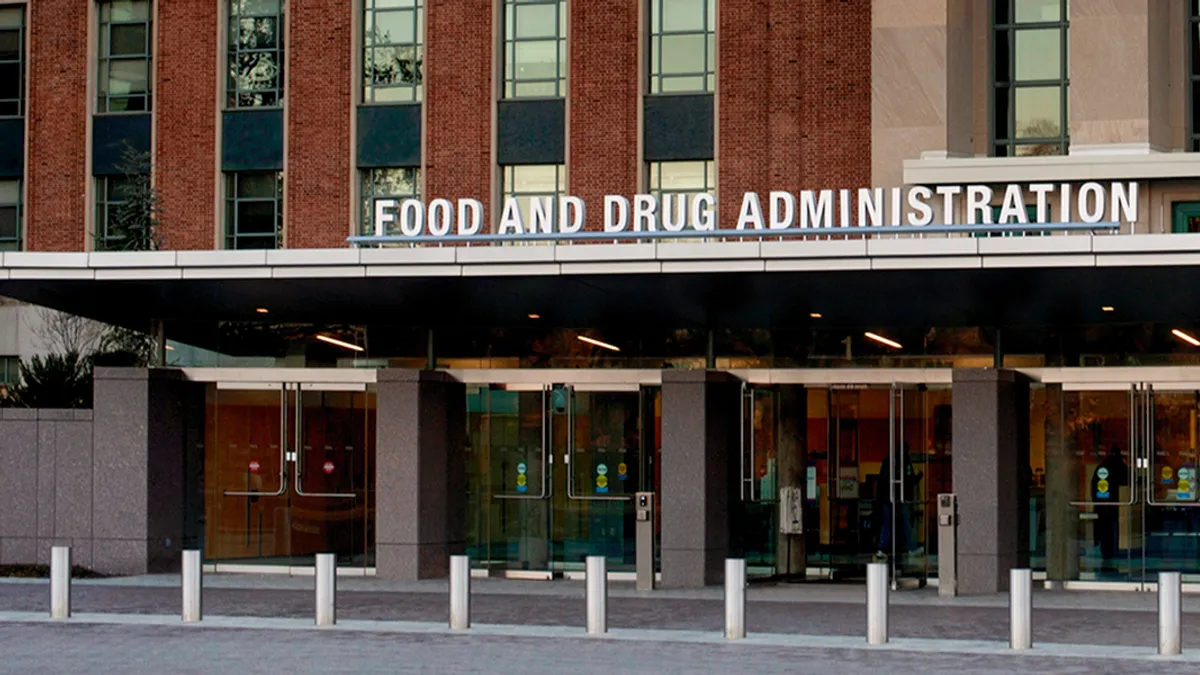Dive Brief:
- FDA late Monday updated its policy impacting private and public labs and commercial manufacturers to increase U.S. capacity for coronavirus diagnostic testing. The guidance, originally issued Feb. 29, is meant to address the "urgent need" to expand the number and variety of COVID-19 diagnostic tests available.
- The agency said that under certain circumstances it "does not intend to object" to commercial manufacturers distributing, and labs using, new commercially developed tests prior to FDA granting an emergency use authorization.
- Also late Monday, FDA said it issued two new EUAs: for Hologic's Panther Fusion SARS-COV-2 Assay, and for LabCorp's COVID-19 RT-PCR test. Commissioner Stephen Hahn said more than 90 test developers have sought agency assistance with developing and validating tests they plan to bring through the EUA process. That's up from 80 the agency referenced late on March 13.
Dive Insight:
Based on stakeholder feedback, the agency believes it has identified a "flexible regulatory approach" for labs and commercial manufacturers, according to Hahn.
Last month's guidance allowed only CLIA-certified, high complexity labs to go through the process to become certified to test. However, FDA has expanded the earlier policy to include commercial manufacturers developing tests for coronavirus with the intention of submitting an EUA to the agency.
"During this public health emergency, the FDA does not intend to object to the distribution and use of these tests for specimen testing for a reasonable period of time after the manufacturer’s validation of the test and while the manufacturer is preparing its EUA request where the manufacturer provides instructions for use of the test and posts data about the test’s performance characteristics on the manufacturer’s website," according to the agency.
Hahn contends the agency's new guidance will result in a "surge" to meet demand for COVID-19 tests, creating a "balance between providing regulatory flexibility while allowing for critical scientific rigor."
The updated policy also enables states to take responsibility for authorizing tests developed and used by labs in their states.
"Laboratories developing tests in these states can engage directly with the appropriate state authorities, instead of with the FDA," according to the updated guidance, which notes that these labs will not have to pursue EUAs with the agency. State departments of health can act as a "surrogate" for the FDA, Hahn said. The model is similar to what FDA announced on Friday it would allow the New York State Department of Health to do.
A senior FDA official acknowledged that one of the "tradeoffs" in the updated policy is the agency forgoing its review of these tests before they reach the marketplace. "On the flip side you will get tests out there a little bit more quickly," he said, and given the growing pandemic, "that tradeoff is worth doing but, again, it does carry risks."
At the same time, Hahn emphasized commercial developers and state authorities must take all necessary steps to ensure the availability of accurate tests. "Inaccurate diagnoses during a pandemic can impair prevention efforts and delay appropriate treatment for sick patients."
The updated policy also provides recommendations for test developers who wish to develop serological tests without an EUA.
More emergency use OKs
Hologic said it expects to provide its lab customers with tens of thousands of SARS-CoV-2 tests this month and beginning in April will produce about 600,000 tests per month. Labs will be able to conduct the test on Hologic’s Panther Fusion system, an automated, high-throughput diagnostic platform that can provide results in less than three hours and process up to 1,150 coronavirus tests in a 24-hour period.
Last week, HHS announced Hologic was selected to receive $699,000 from BARDA for development of the high-throughput COVID-19 test.
Thermo Fisher's high-throughput test received EUA from FDA late Friday. The medtech was the second commercially available test to win an EUA from the agency, after Swiss giant Roche announced an FDA nod early Friday. Vice President Mike Pence said on Sunday the high-throughput coronavirus tests from both Roche and Thermo Fisher will enable testing to be processed "much more rapidly and at a much higher volume" with the White House promising 1.9 million tests to be made available this week at 2,000 labs nationwide.
BD and molecular diagnostics company BioGX announced late Monday they have submitted EUA requests to the FDA for new diagnostic tests to increase the capacity to screen for COVID-19 by thousands of tests per day.












